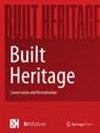Approaches to sustaining people–place bonds in conservation planning: from value-based, living heritage, to the glocal community
Q1 Arts and Humanities
引用次数: 0
Abstract
This review paper explores approaches to sustaining the enduring connection between communities and heritage places in conservation planning. Amidst global overtourism, the gradual outmigration and sudden displacement of local communities from heritage places disrupt not only physical ties between people and places but also shared traditions, memories and emotional bonds. These intangible qualities constitute the social dimension of heritage and are pivotal to its cultural significance. However, existing conservation approaches to safeguarding this social dimension often rely on the continued presence of local communities, which may yield limited effectiveness in restoring people–place bonds amidst challenges posed by overtourism and displacement. This review unpacks the term ‘social value’ within the framework of value-based assessment and progresses towards a dynamic conception of ‘sense of place’. In response to the changing social composition of ‘local communities’ at heritage places, this review examines approaches for conserving the social dimension of heritage, aiming to sustain the enduring continuity of people–place bonding. It proposes a broader definition of ‘sense of place’ that transcends the preconceived notion of stakeholder groups as a geographically defined community and suggests leveraging digital social platforms to re-establish these bonds. The review concludes by advocating for the ‘glocal community’ approach, acknowledging the personal emotional connections that individuals form with a heritage place regardless of their places of residence. This approach has the potential to complement existing methods, such as value-based assessment and the living heritage approach, which are commonly practised in contemporary conservation efforts.在保护规划中维持人地关系的方法:从基于价值的活遗产到地方社区
本综述文件探讨了在保护规划中维持社区与遗产地之间持久联系的方法。在全球过度旅游的背景下,当地社区逐渐迁出遗产地或突然离开遗产地,这不仅破坏了人与遗产地之间的物质联系,也破坏了共同的传统、记忆和情感纽带。这些非物质品质构成了遗产的社会维度,对其文化意义至关重要。然而,现有的保护社会维度的方法往往依赖于当地社区的继续存在,在过度旅游和流离失所带来的挑战中,这种方法在恢复人与地方的联系方面可能效果有限。本综述在以价值为基础的评估框架内解读了 "社会价值 "一词,并逐步形成了 "地方感 "的动态概念。为应对遗产地 "当地社区 "不断变化的社会构成,本综述探讨了保护遗产的社会维度的方法,旨在维持人与地方之间纽带的持久连续性。它对 "地方感 "提出了一个更广泛的定义,超越了利益相关者群体作为一个地理上界定的社区的先入为主的概念,并建议利用数字社交平台来重建这些联系。综述最后提倡 "全域社区 "方法,承认个人与遗产地形成的情感联系,无论其居住地在哪里。这种方法有可能补充现有的方法,如当代保护工作中普遍采用的基于价值的评估和活遗产方法。
本文章由计算机程序翻译,如有差异,请以英文原文为准。
求助全文
约1分钟内获得全文
求助全文

 求助内容:
求助内容: 应助结果提醒方式:
应助结果提醒方式:


